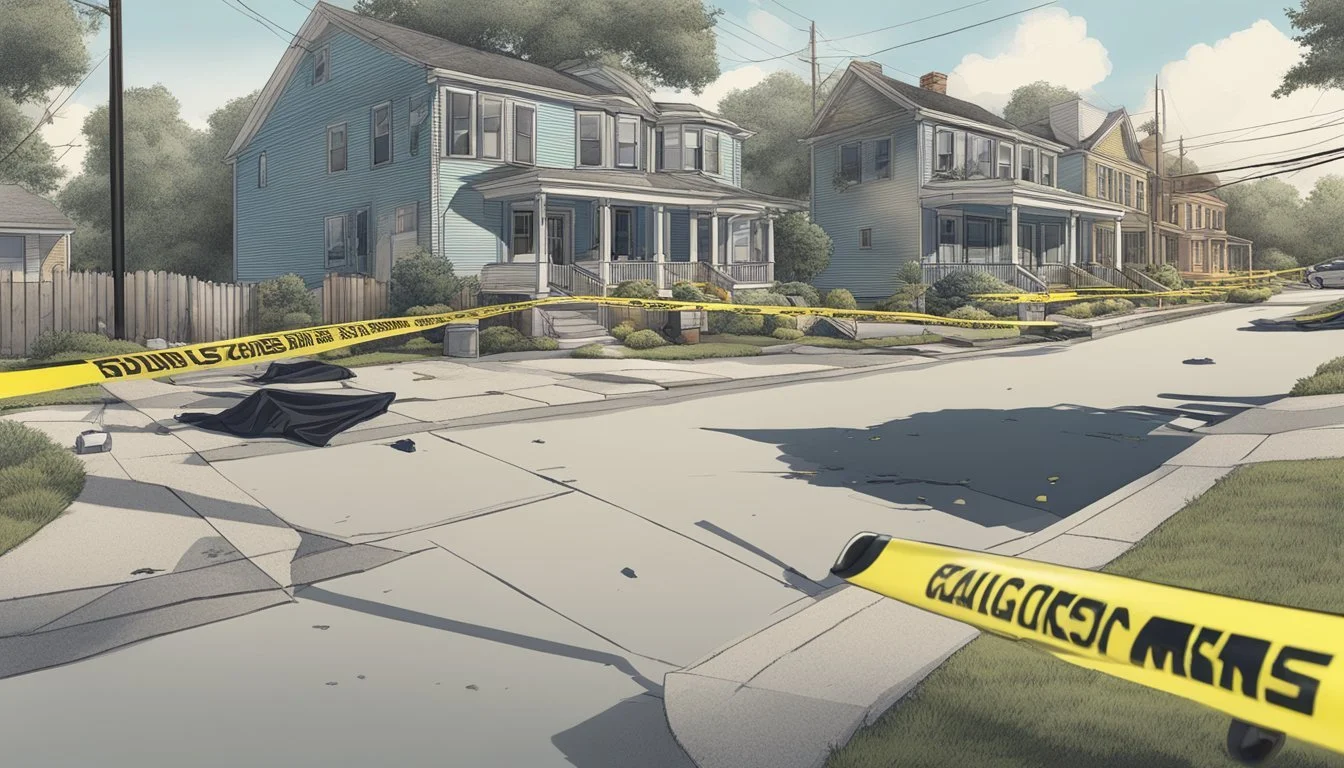Reinaldo Rivera's Augusta Aftermath: Killer Awaits Execution on Death Row as Appeals Exhaust
Reinaldo Rivera's reign of terror in Augusta, Georgia left a haunting legacy. From 1999 to 2000, he abducted, raped, and murdered four young women in the area, shattering the sense of safety in the community. Rivera was convicted and sentenced to death in 2004 for the killing of Marni Glista, but remains on death row nearly two decades later.
The aftermath of Rivera's crimes continues to impact Augusta. Survivors and victims' families grapple with trauma and loss, while the legal system navigates the complexities of capital punishment. Rivera's case highlights the prolonged nature of death penalty appeals, as he awaits execution years after his conviction.
Augusta residents still remember the fear that gripped the city during Rivera's killing spree. His attacks on young women sent shockwaves through the community, forever altering perceptions of safety. While time has passed, the scars left by Rivera's actions remain, serving as a somber reminder of the lives lost and the enduring impact of violent crime.
Reinaldo Rivera: Early Life and Background
Reinaldo Javier Rivera was born on September 13, 1963, in Spain. His early years were spent in his home country before he made the significant move to the United States.
Rivera settled in the Augusta metropolitan area, straddling the border between Georgia and South Carolina. This location would later become the center of his criminal activities.
Prior to his crimes, Rivera served in the United States Navy. This period of military service provided him with structure and discipline, contrasting sharply with his later actions.
After his time in the Navy, Rivera established himself in civilian life. He found employment and integrated into the local community, giving no obvious signs of the violence he would later perpetrate.
Rivera's transition from a seemingly ordinary resident to a serial killer occurred in the late 1990s. His criminal spree primarily took place between 1999 and 2000, targeting young women in and around Augusta.
The contrast between Rivera's early life and his later crimes remains a subject of interest for those studying criminal behavior. His background offers few clear indicators of the brutal acts he would eventually commit.
The Augusta Ripper's Crime Spree
Reinaldo Rivera terrorized the Augusta metropolitan area with a series of brutal attacks from 1999 to 2000. His crimes included rape, murder, and abduction, leaving a trail of fear and devastation in the community.
Timeline of Murders and Attacks
Rivera's first documented attack occurred on June 29, 1999, when he abducted and assaulted a 17-year-old girl in Augusta. The victim managed to escape, providing crucial information to investigators.
In July 2000, Rivera claimed his first murder victim, Tiffaney Shereese Wilson. Over the next few months, he escalated his violence.
On September 4, 2000, Rivera attacked Marni Glista, who later died from her injuries.
Two weeks later, he murdered Melissa Dingess.
Rivera's final known victim was Tabitha Bosdell, killed on October 10, 2000.
Victims of Reinaldo Rivera
Rivera's victims were young women in the Augusta area. His confirmed murders include:
Tiffaney Shereese Wilson, 17
Marni Glista, 21
Melissa Dingess, 17
Tabitha Bosdell, 17
Chrisilee Barton, 18, survived a vicious attack by Rivera. Her testimony proved crucial in identifying the killer.
Rivera's method typically involved abduction, rape, and stabbing. He left survivors with severe physical and emotional trauma.
Capture and Arrest
Rivera's crime spree ended in October 2000. After attacking Chrisilee Barton, he fled but left behind crucial evidence.
Barton's description helped police create a composite sketch. This led to Rivera's identification and arrest on October 18, 2000.
During interrogation, Rivera confessed to multiple murders. Police found evidence linking him to the crimes in his home and vehicle.
The arrest brought relief to the terrified Augusta community. Rivera's capture marked the end of a dark period for the region.
Legal Proceedings and Conviction
Reinaldo Rivera faced trial in Richmond County Superior Court for his brutal crimes. The prosecution presented compelling evidence, including Rivera's confession and DNA analysis. After deliberations, the jury reached a decisive verdict.
Trial in Richmond County Superior Court
The trial of Reinaldo Rivera took place in Richmond County Superior Court in Georgia. Prosecutors sought the death penalty for Rivera's heinous crimes. The court proceedings drew significant public attention due to the shocking nature of the murders. Rivera was represented by court-appointed defense attorneys who faced the challenging task of defending their client against overwhelming evidence.
Evidence Presented
Law enforcement presented a substantial case against Rivera. DNA evidence linked him to multiple crime scenes. Investigators detailed their findings, including physical evidence collected from victims and locations. Forensic analysts testified about DNA matches and other scientific evidence. The prosecution also presented Rivera's psychological profile, which painted a disturbing picture of his motivations and mental state.
Reinaldo Rivera's Confession
Rivera's confession played a crucial role in the trial. He admitted to killing four women and attacking others. Rivera provided details about his crimes that only the perpetrator would know. The confession, coupled with physical evidence, strengthened the prosecution's case significantly. Law enforcement officials testified about obtaining the confession and its contents.
Verdict and Conviction
The jury found Reinaldo Rivera guilty on all counts. They convicted him of murder, rape, and other related charges. The court sentenced Rivera to death for his crimes. The verdict brought a sense of justice to the victims' families and the Augusta community. Rivera's conviction marked the end of a terrifying chapter in Georgia's criminal history. Following his conviction, Rivera was placed on death row, where he awaits execution.
Post-Conviction: Appeals and Death Row
Reinaldo Rivera's case has progressed through multiple legal stages since his conviction. His appeals have narrowed in scope over time, while he remains on death row in Georgia awaiting final decisions on his fate.
Habeas Corpus and Appeals Process
Rivera filed a petition for a writ of habeas corpus in U.S. District Court in Augusta. This legal action challenges the legality of his detention and places the burden of proof on the state to justify his imprisonment. The appeals process has involved multiple stages, including reviews by the Georgia Supreme Court and potentially the U.S. Supreme Court.
Rivera's legal team has pursued various avenues to challenge his conviction and death sentence. These efforts have included claims of ineffective assistance of counsel and challenges to the constitutionality of his sentencing.
Current Status on Death Row
As of September 2024, Rivera remains on death row while his federal appeal is pending. His appeal has been significantly narrowed, with only a single remaining claim under consideration. This reduction in scope suggests that many of his previous arguments have been rejected by the courts.
Rivera, now in his early 60s, continues to face the possibility of execution by lethal injection. The timeline for resolution of his final appeal remains uncertain, as death penalty cases often involve protracted legal proceedings.
Public and Legal Perspectives
The Rivera case has drawn attention from both the public and legal communities. Victims' families have expressed frustration with the lengthy appeals process, seeking closure after decades of legal proceedings.
Some legal experts argue that thorough appeals are crucial to ensure justice in capital cases. Others contend that prolonged appeals unnecessarily delay the implementation of jury verdicts.
The case has also sparked debates about the effectiveness and ethics of the death penalty in Georgia. Advocates on both sides continue to cite the Rivera case in discussions about capital punishment reform.
Impact on Communities
Reinaldo Rivera's killing spree left deep scars on Augusta and nearby areas. His crimes shook residents' sense of safety, altered daily routines, and affected local economies. The aftermath continued to reverberate long after his capture.
Response from Augusta and Surrounding Areas
Augusta and neighboring communities reacted with fear and vigilance during Rivera's active period. Residents, especially women, took extra precautions. Many avoided going out alone or at night. Local law enforcement increased patrols and set up checkpoints.
Neighborhood watch programs expanded rapidly. Community meetings became frequent, focusing on safety measures and updates on the investigation. Schools and colleges implemented stricter security protocols.
The atmosphere of fear persisted even after Rivera's arrest. Many residents remained wary, struggling to regain their sense of security. Support groups formed to help victims' families and survivors cope with trauma.
Effect on Local Businesses
Local businesses, particularly those catering to women or operating at night, saw significant impacts. Many bars, restaurants, and shops reported decreased foot traffic and sales. Some adjusted their hours, closing earlier to protect staff and customers.
Security companies saw increased demand for home and personal safety products. Self-defense classes became popular. Some businesses hired additional security personnel.
The tourism industry in Augusta suffered temporary setbacks. Hotel bookings declined during the height of the crisis. However, most businesses recovered within a year of Rivera's capture.
Long-term Consequences of the Crimes
The Rivera case led to lasting changes in Augusta and surrounding areas. Law enforcement agencies improved coordination and communication protocols. The city invested in better street lighting and security cameras in public spaces.
Educational programs on personal safety became standard in schools and community centers. The incident sparked ongoing discussions about violence against women and community policing strategies.
Local mental health services expanded to meet increased demand for counseling and support. The case also influenced local politics, with public safety becoming a key issue in subsequent elections.
Media and Cultural Depictions
Reinaldo Rivera's crimes have been the subject of true crime media and public discourse. His case has been featured in documentaries and books, shaping perceptions of the Augusta area's history.
True Crime Documentaries and Books
Several documentaries have explored Rivera's crimes:
"The Augusta Ripper" (2015)
"Killer in Plain Sight: Reinaldo Rivera" (2018)
"Georgia's Forgotten Killer" (2020)
These productions detail Rivera's modus operandi, victim profiles, and the investigation that led to his capture. Books like "The Augusta Strangler" (2012) and "River City Killer" (2017) provide in-depth analyses of the case.
The Role of Media in Shaping Public Opinion
Local news outlets extensively covered Rivera's trial and sentencing. This coverage heightened community awareness about personal safety. Some critics argue media portrayals sensationalized the crimes.
Social media discussions continue to revisit the case, keeping it in public consciousness. Online true crime forums debate details of Rivera's crimes and legal proceedings. Media attention has influenced perceptions of Augusta's crime rates and safety.
Key Locations in the Story
The Reinaldo Rivera case unfolded across several significant sites in the Augusta metropolitan area. These locations played crucial roles in the crimes, investigation, and legal proceedings that followed.
Sites of the Crimes
Rivera's attacks occurred in various locations throughout Augusta and neighboring areas. One victim was abducted from Oakridge Drive in Augusta. Fort Gordon, a nearby military installation, was connected to the case as Rivera had previously worked there. Doctors Hospital in Augusta became a key site when Rivera's final victim, Melissa Dingess, was found alive in the trunk of his car in the hospital parking lot.
The University of South Carolina Aiken campus was another notable location, as one of Rivera's victims was a student there. Richmond County, which encompasses Augusta, was the primary jurisdiction for many of the crimes and subsequent investigations.
Courthouses and Law Enforcement Agencies
The Richmond County Sheriff's Office led the investigation into Rivera's crimes. Their headquarters in Augusta served as the central hub for evidence gathering and case coordination. The Augusta Judicial Center and John H. Ruffin Jr. Courthouse was the site of Rivera's trial and sentencing.
Law enforcement agencies in neighboring South Carolina also played a role, as some of Rivera's crimes crossed state lines. The Aiken County Sheriff's Office and the South Carolina Law Enforcement Division (SLED) contributed to the investigation and case building.
The Federal Bureau of Investigation (FBI) assisted local agencies, providing resources and expertise in tracking Rivera's movements across jurisdictions. Their involvement highlighted the case's significance beyond the local level.
Psychological Profile and Motivations
Reinaldo Rivera's psychological profile reveals a complex and disturbing individual. As a serial killer, he displayed traits commonly associated with antisocial personality disorder and psychopathy.
Rivera's crimes centered around sexual assault and murder, indicating severe sexual deviancy. His modus operandi involved targeting young women, suggesting a predatory nature and lack of empathy.
Experts believe Rivera may have suffered from sexual addiction, using violence as a means to fulfill his urges. This compulsion likely stemmed from deep-seated psychological issues and a distorted view of relationships.
Childhood experiences and potential trauma could have contributed to Rivera's deviant behavior. However, specific details about his early life and its impact on his criminal actions remain unclear.
Rivera's military background and work with high-level government agencies present a stark contrast to his violent crimes. This duality highlights the complexity of his psychological makeup.
The bipolar disorder and manic depression medications Rivera reportedly takes in prison add another layer to understanding his mental state. These conditions may have influenced his behavior, but do not excuse his heinous acts.
Looking Ahead: Capital Punishment and Case Legacy
Reinaldo Rivera's death sentence remains unexecuted as legal processes continue. His case has impacted the justice system and community perceptions in Augusta and beyond.
Pending Execution and Legal Considerations
Rivera sits on Georgia's death row awaiting execution by lethal injection. His final appeals are underway in federal court. The process could take years to conclude.
Death penalty cases face extensive scrutiny. Courts review claims of constitutional violations or new evidence. Rivera's attorneys may argue issues like inadequate representation or mental health concerns.
The U.S. Supreme Court could potentially weigh in on aspects of the case. Public opinion on capital punishment continues to evolve, potentially influencing the outcome.
Georgia's execution protocols may also face challenges. Difficulties obtaining lethal injection drugs have caused delays in other states.
Legacy of the Case and Lessons Learned
Rivera's crimes left a lasting impact on Augusta. The case highlighted vulnerabilities in public safety and victim support systems.
Law enforcement improved inter-agency communication and evidence processing. New protocols were implemented for responding to missing persons reports.
Victim advocacy groups expanded services for survivors and families. Community awareness programs focused on personal safety increased.
The justice system faced scrutiny over the handling of Rivera's earlier offenses. This led to reforms in tracking and prosecuting sexual assault cases.
Media coverage of the trials raised ethical questions about reporting on violent crimes. It sparked discussions on balancing public interest with victims' privacy.









